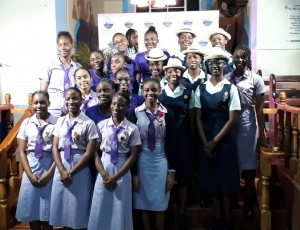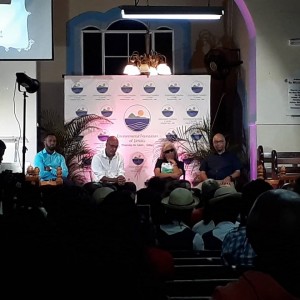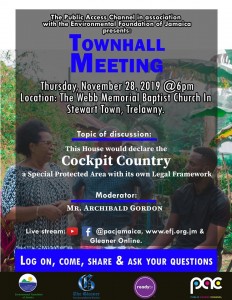
Cockpit Country: Is It Really All About the Boundaries?
November 29th, 2019
Ceiling fans whirred and night sounds crept through the windows of the Webb Memorial Baptist Church in Stewart Town, Trelawny earlier this evening.
A Town Hall Meeting was in progress, streamed live on Facebook on the websites of the sponsors, the Environmental Foundation of Jamaica (EFJ), the Public Access Channel (PAC) and the Jamaica Gleaner. The discussion was ably moderated by journalist Archibald Gordon. Kudos to the EFJ for funding the meeting. If you would like to watch the two hour meeting in full, I shared it on my Facebook page here. (Scroll down). You can also see it on the EFJ page.
The topic was phrased as a debate: This House Would Declare the Cockpit Country a Special Protected Area With Its Own Legal Framework. Panelists were the untiring environmentalist at the Southern Trelawny Environmental Agency, Hugh M. Dixon – an Albert Town man; filmmaker and activist Esther Figueroa; and Dr. David Smith, Coordinator for the Institute of Sustainable Development at the University of the West Indies, Mona. The audience included mainly local people – farmers, residents, and students from two girls’ schools – St. Hilda’s High School in Brown’s Town, St. Ann and Westwood High School, situated in Stewart Town itself.

Students of Westwood High School and St Hilda’s High School at the Town Hall meeting. (Photo: EFJ/Facebook)
Dr. Smith tried to clarify the legal situation regarding Cockpit Country. Firstly, the Mining Act of 1947 is in dire need of updating. Of course, Jamaica was still a colony then! This document from the Jamaica Environment Trust explains it very clearly. As Esther Figueroa pointed out, if someone has a license to prospect or mine on your land, you get just two weeks’ notice before operations begin. You have the right to demand compensation from the mining company. That’s it.
Secondly, Dr. Smith noted that there are no regulations for “Protected Areas” in Jamaica. Laws are nothing without regulations – they have no “teeth.” It would be more feasible to have Cockpit Country declared a National Park, as the regulations are there, he suggested. Moreover, new laws take decades to write. One has to work with what one has now.
Back in June, Prime Minister Andrew Holness is quoted as saying:
“I believe there is still substantial agreement (on the boundaries). I didn’t say there is universal agreement or that everybody agrees. But Government has to act. And in a democracy, the Government tries to act when we have (in most cases) majority agreement. I think what we have, substantially satisfies the major concerns. There are issues which we are going to resolve. There are issues we are going to hear and discuss. But I think what I am hearing from all stakeholders is, where you have agreement already to protect, move fast to protect those areas. What we have settled on, let us protect it.”
Why did the Government “have to act”? In two words: Noranda Bauxite.

Panelists at the Town Hall meeting: (l-r) moderator Archibald Gordon; Hugh Dixon, STEA; filmmaker/activist Esther Figueroa; and David Smith from the Institute of Sustainable Development. (Photo: EFJ/Facebook)
Why does the unease over Cockpit Country persist? It emerged from the discussion that the concerns aren’t necessarily exactly where the boundaries will be (they are not yet “declared” – not until the ground-truthing being conducted by the Forestry Department is completed). It is something a little less physical, but rather psychological – in other words, it is about governance and proper communication. It is about regret, fears for the future, the marginalization of and disregard for small, hard-working communities. It is about the destruction of a way of life, about survival. It is about managing and protecting the environment.
I believe the Government has underestimated this aspect of the Cockpit Country issue. You cannot walk over people’s lives, families, communities and way of life. You cannot “tour the Cockpit Country” in half a day, either, Mr. Prime Minister.
It is also about, as Dr. Smith noted, the simple fact that “You can’t sustainably manage a finite resource.” What happens when it runs out, and the land is ruined, and the mining jobs are no more? The case of the island of Nauru was cited. Most of the island was mined for phosphate. Now the phosphate has run out, money done, and the island is dirt poor, literally.
It comes down to money. The panelists agreed that an accounting needs to be done. If there was no mining in Cockpit Country, how many would benefit? How many would lose out? Stewart Town was the location for an interpretive guide training exercise by the Caribbean Birding Trail (organized by BirdsCaribbean) and the eco-tourism potential is considerable – directly impacting residents as a viable livelihood. What is the real cost, in terms of water and what are called ecosystem services?
An intervention by a local woman brought tears to my eyes. She prefaced her words with “From the day I was born, I know the Lord created the Earth” – but the Lord did not create boundaries. She spoke of her childhood in Cockpit Country – how if the crops were not doing too well, her father would go to the “old yam bush” and they would make do (and enjoy) what he brought back; how schoolchildren would fill their pockets with tangerines, and there was plenty for them. She ended in a cry of despair:
“How on Earth are our little children to survive? How are we to survive? You grieving us, PM!”
This took place just a few days after Minister of Mining Robert Montague told Parliament that no, the Special Mining Lease (SML) 173 granted to Noranda Bauxite Jamaica to mine in Cockpit Country will not be revoked. A few days before that, the Minister had declared that “every inch” of Jamaica was available to be prospected for anything from bauxite to gold to copper, and that 90 (!) prospecting licenses had been issued in the past year. This news is just starting to sink in.
Throughout the discussion, I kept thinking about Mike Schwartz, a passionate campaigner, at the Windsor Research Centre. He walked the hills and valleys advocating for the protection of Cockpit Country. Mike died last year. I wondered if his presence was in the neat little church, among the farmers, the schoolchildren, the teachers, the environmentalists. I wonder what he would have said.
Mike might have been there, but the politicians (from either side of the fence) were quite conspicuous by their absence. They had, apparently, been invited. However, the residents were advised to petition their political representatives with their views.
“If politicians have no vision, you will see it in their eyes,” someone said.
Where is the vision? Or have the blinkers been put on?
Tags: Andrew Holness, Archibald Gordon, bauxite mining, BirdsCaribbean, Caribbean Birding Trail, Cockpit Country, David Smith, education, EFJ, Environmental Foundation of Jamaica, Esther Figueroa, Facebook, Hugh Dixon, human rights, Institute of Sustainable Development, Jamaica Environment Trust, Jamaica Gleaner, journalism, Michael Schwartz, mining, Mining Act, Minister of Transport and Mining, NGO, Noranda, Prime Minister, Public Access Channel, Robert Montague, social media, Southern Trelawny Environment Agency, St Hilda's High School, Stewart Town, sustainable development, tourism, Trelawny, University of the West Indies, water resource management, Westwood High School
The Gleaner reserves the right not to publish comments that may be deemed libelous, derogatory or indecent.
To respond to The Gleaner please use the feedback form.
One Response to “Cockpit Country: Is It Really All About the Boundaries?”
- We Are the Zoomers
- Living Online with Humans and Birds: NAOC 2020
- Human Trafficking and the Problem of Public Education
- Down Memory Lane
- Are We Ready to Recover from COVID-19?
- Road Safety Matters: Is Your Vehicle Safe?
- Sexual Harassment, Me Too, and the Minister’s Disturbing Giggle
- The Vulnerable Senior Citizens, Private Care Homes and COVID-19
- A Muddle Over Masks
- Here is Something Life-Saving You Can Do: Give Blood!




The government will sell the future of JAMAICA off for $80 us, million dollars. Noranda is a traded company who is only concern is profit, IF they can get away with it they rape the cock pit enviroment, Please the people of Jamaica must stand as one in the defence of this God given heritage. May God come in defence of His creation.